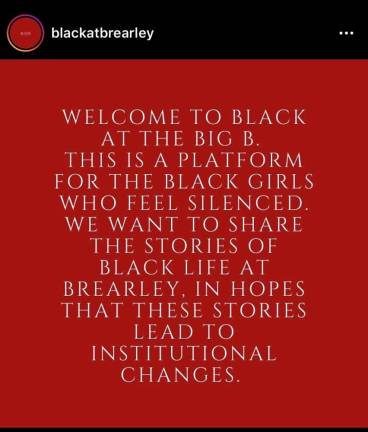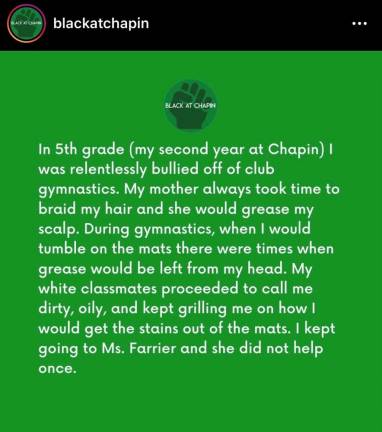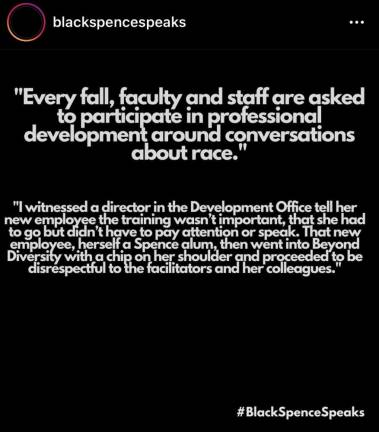Black at Private Schools
Graduates and students from Brearley, Chapin and Spence share experiences on Instagram of discrimination and racism



In the midst of a national reckoning on police brutality and racial injustice, alumni and students from some of New York City’s most prestigious private schools have been sharing their experiences of what it’s like to be Black at these elite institutions, detailing accounts of discrimination and racism.
Graduates from the all-girls Brearley School, the Chapin School and the Spence School have created Instagram accounts so alums and current students could share anonymously what life was like for Black students. It began on May 31, with a Black Chapin School graduate, Miesha Agrippa, from the class of 2016, posting a letter calling for change at Chapin — namely doing more for its Black students and committing to promoting anti-racism — to her private Instagram account.
“Chapin has not sufficiently reflected on or explicitly acknowledged its own institution’s role in perpetuating racism in all of its forms, from explicit acts of racism to manifestations of unconscious biases,” the letter reads. “Instead of asking open-ended questions, Chapin must take this opportunity to direct its resources toward finding answers and producing solutions to problems that are pervasive in its own halls.”
The letter was subsequently signed by hundreds of alumni and students. Agrippa then began sharing testimony from other alums on her personal feed, eventually creating a separate account called “BlackatChapin.”
The account inspired Brearley and Spence graduates to create similar accounts: “BlackatBrearley” and “BlackSpenceSpeaks.”
The Brearley account recounts instances of racist name-calling by white students as well as unfair treatment by teachers and faculty.
“In 5th grade, when we were talking about slavery, a white girl asked why the slaves didn’t just run away because Africans can run so fast,” one post read. Another states, “A white student once told me the reason my skin was so dark was because I didn’t clean myself.”
Some posts claim that the college counselor discourages Black students from applying to elite universities. Another alleges that Stephanie Hull, Brearley’s first and only Black head of school, was forced to resign, which she did in 2011.
Action Items
With “BlackSpenceSpeaks,” the account creators call it “an endeavor to expose subtle and overt racism and provide a space for solidarity among students of color.” These graduates and students have also come up with action items for the school to take in order to repair its relationship with Black students and to become an anti-racist institution. The group calls for the school to incorporate more Black history into the curriculum, hire a faculty that better reflects the school and city’s demographics, create an anonymous feedback system for each class so students can feel comfortable to report bias incidents, among several other demands.
In a report from the Wall Street Journal, the head of each school expressed remorse and a willingness to change the schools’ environments.
“We greatly respect and admire the courage and candor of our Black alumnae and current students who are sharing their own painful experiences of anti-Black racism at Brearley,” said Jane Foley Fried of Brearley. “The behavior they have described is unacceptable and cannot be tolerated in any part of our community. We hear their voices, and we are deeply sorry for the pain they have experienced.”
Patricia Hayot, the head of Chapin, said that the administration and staff are focused on taking action, adding that she is committed to re-examining the school’s curricula, diversifying her staff, and creating channels for students to report incidents.
The head of Spence, Bodie Brizendine, said that she would work to make the community better.
“We pledge our commitment to prioritize equity, anti-racism, and strong advocacy,” she told the Journal. “We salute our students and alumnae for their strong voices; we thank them for their loyalty, for their activism and for their love of school.”
“Chapin must take this opportunity to direct its resources toward finding answers and producing solutions to problems that are pervasive in its own halls.” Miesha Agrippa, Chapin class of 2016